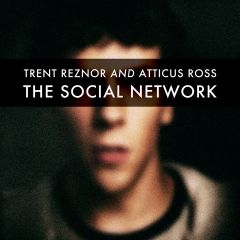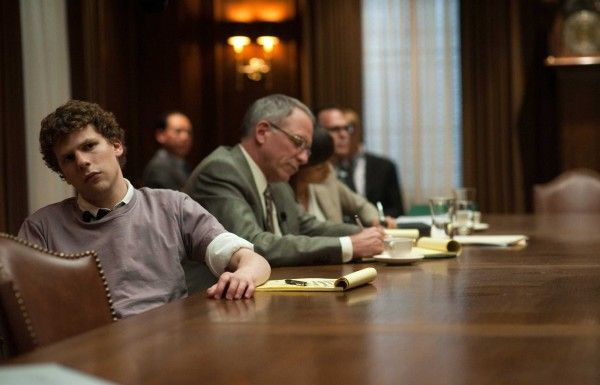David Fincher’s The Social Network claimed phenomenal critical success upon its release a mere three weeks ago, and appears to be an early frontrunner for Best Picture of the Year. Part of the film’s accomplishment must be attributed to unsung heroes Trent Reznor and Atticus Ross for crafting an electronically hip, unpretentious score, one that drives the film’s narrative without overwhelming the viewer. For me it’s one of the best scores of the year, to the Academy of Motion Pictures Arts and Sciences, however, it will be seen as an electronic nightmare, one not worthy of their standards.Over the years the Oscars have made it perfectly clear that they prefer classical scores to the electronic works that have since taken the cinema world by storm. Michael Giacchino won last year for his inspired work for Pixar and Disney’s Up, a fine score to be sure, but he beat out both Hans Zimmer and James Horner who, one could argue, crafted masterful works for Sherlock Holmes and Avatar (that Leona Lewis song notwithstanding) that were largely electronic in nature. Reznor and Ross’ score carries with it a Zimmer-ish vibe, particularly during the opening credits, but takes its tone one step further, erupting as a full-blown rock album in several instances. Such a fine, well-crafted work should not be overlooked by the Academy. Hit the jump for more. I’ve made it perfectly clear to friends and colleagues that The Social Network is my favorite film of the year. As much as I loved Christopher Nolan’s Inception, and Ben Affleck’s The Town for that matter, I’m literally addicted to Fincher’s film – for the record I’ve seen it a whopping four times and plan on taking a buddy of mine to see it this weekend. The film, which tells the story of Mark Zuckerberg and his creation of the popular internet site Facebook, has been criticized for diverging from the truth, but I don’t care! Fincher has crafted a masterful work of art that more or less sums up the past decade – angry computer geeks, snotty Harvard grads and the rise of the social internet.While his film will undoubtedly nab plenty of Oscars come March (or else I’ll jump off a cliff), one can assume that Nine Inch Nails artist Reznor and co-hort Ross will be snubbed for their work. Hell, they may not even receive a nomination. And why should they? With their terrific score they merely provide the film with a cinematic pulse and rhythm that stands out as its own defining character. Remember the early bits when Zuckerberg, played by Jesse Eisenberg, begins formulating Facesmash.com and the film jumps back and forth from a Harvard club (known as the Phoenix) and Zuckerberg in his room? The score rises and falls with the action, adding a seedy, if not hypnotic layer to the proceedings. Reznor and Ross utilize electronic beats, complete with computerized sound FX, to formulate the musical flow of information that is surely encompassing Zuckerberg’s mind. Later, during a row boat race, they reinterpret Edvard Grieg’s In the Hall of the Mountain King, pumping it up with an electronic vibe – signifying a classical world (note the onlookers during the scene, dressed in rich attire, are reminiscent of a 1950s period piece) that has literally gone digital.
I’ve made it perfectly clear to friends and colleagues that The Social Network is my favorite film of the year. As much as I loved Christopher Nolan’s Inception, and Ben Affleck’s The Town for that matter, I’m literally addicted to Fincher’s film – for the record I’ve seen it a whopping four times and plan on taking a buddy of mine to see it this weekend. The film, which tells the story of Mark Zuckerberg and his creation of the popular internet site Facebook, has been criticized for diverging from the truth, but I don’t care! Fincher has crafted a masterful work of art that more or less sums up the past decade – angry computer geeks, snotty Harvard grads and the rise of the social internet.While his film will undoubtedly nab plenty of Oscars come March (or else I’ll jump off a cliff), one can assume that Nine Inch Nails artist Reznor and co-hort Ross will be snubbed for their work. Hell, they may not even receive a nomination. And why should they? With their terrific score they merely provide the film with a cinematic pulse and rhythm that stands out as its own defining character. Remember the early bits when Zuckerberg, played by Jesse Eisenberg, begins formulating Facesmash.com and the film jumps back and forth from a Harvard club (known as the Phoenix) and Zuckerberg in his room? The score rises and falls with the action, adding a seedy, if not hypnotic layer to the proceedings. Reznor and Ross utilize electronic beats, complete with computerized sound FX, to formulate the musical flow of information that is surely encompassing Zuckerberg’s mind. Later, during a row boat race, they reinterpret Edvard Grieg’s In the Hall of the Mountain King, pumping it up with an electronic vibe – signifying a classical world (note the onlookers during the scene, dressed in rich attire, are reminiscent of a 1950s period piece) that has literally gone digital. Perhaps you might have missed the score entirely as it mostly lurks in the background as a vicious and foreboding character. I took it as the digitally-warped soul of Zuckerberg – lonely, isolated and completely robotic with moments of ferocious intensity, and sad isolation sprinkled throughout. Those piano strokes might even represent his human nature attempting to break free from its digitalized prison.Truly this is a masterful achievement, but will it receive recognition? Past Oscar experience tells us no. I think a lot of film score fans are still aching from when Zimmer and James Newton Howard were omitted from the race entirely in 2008 for their score to The Dark Knight – I know I am. The Academy doesn’t see a work as brilliantly crafted as the Joker’s theme (played with string instruments and razor blades) as an artistic achievement. That year the Academy nominated Alexandre Desplat for his work on The Curious Case of Benjamin Button, James Newton Howard for Defiance, Danny Elfman for Milk, and Thomas Newman for WALL E and gave the award to Slumdog Millionaire’s A.R. Rahman. One might argue that both Newman’s and Rahman’s score were mostly electronic, but since Newman has never won an Oscar (gasp!) and Rahman’s work comprised of ethnic vocal work and quiet guitar beats, I’m gonna still go ahead and call it prejudice on the Academy’s part.Ironically, the score to beat this year is Zimmer’s score for Inception, which is largely orchestral in nature. John Powell deserves some recognition for How to Train Your Dragon, which too encompasses mostly traditional instruments with very little electronic influence. Desplat’s score for the upcoming Harry Potter and the Deathly Hallows – Part One is likely to garner attention from the Academy, as his (hopefully) Clint Mansell’s work for Black Swan and perhaps even David Arnold’s The Chronicles of Narnia: The Voyage of the Dawn Treader score. Yet, what of Daft Punk’s hypnotic soundtrack for the upcoming TRON: Legacy, featured so prominently (and successfully) in the trailers? Does it not deserve some kind of acknowledgment (granted, I haven’t heard the whole thing, but the samples are terrific)? Should it be ignored because it doesn’t go the traditional route? Isn’t the whole purpose of the Oscars to grant approval towards originality (something film critics in general berate Hollywood for lacking)?The electronic score has been around for a while now and is slowly, but surely, taking over. I’m a fool not to mention John Willams in this debate as he is the last true classical composer alive (and even he has utilized synthesizers in recent works including Minority Report and Indiana Jones and the Kingdom of the Crystal Skull) – yet, his is a dying breed. For better or worse, electronic scores are becoming the norm. It’s time for the Academy to recognize them.You can purchase the soundtrack to The Social Network
Perhaps you might have missed the score entirely as it mostly lurks in the background as a vicious and foreboding character. I took it as the digitally-warped soul of Zuckerberg – lonely, isolated and completely robotic with moments of ferocious intensity, and sad isolation sprinkled throughout. Those piano strokes might even represent his human nature attempting to break free from its digitalized prison.Truly this is a masterful achievement, but will it receive recognition? Past Oscar experience tells us no. I think a lot of film score fans are still aching from when Zimmer and James Newton Howard were omitted from the race entirely in 2008 for their score to The Dark Knight – I know I am. The Academy doesn’t see a work as brilliantly crafted as the Joker’s theme (played with string instruments and razor blades) as an artistic achievement. That year the Academy nominated Alexandre Desplat for his work on The Curious Case of Benjamin Button, James Newton Howard for Defiance, Danny Elfman for Milk, and Thomas Newman for WALL E and gave the award to Slumdog Millionaire’s A.R. Rahman. One might argue that both Newman’s and Rahman’s score were mostly electronic, but since Newman has never won an Oscar (gasp!) and Rahman’s work comprised of ethnic vocal work and quiet guitar beats, I’m gonna still go ahead and call it prejudice on the Academy’s part.Ironically, the score to beat this year is Zimmer’s score for Inception, which is largely orchestral in nature. John Powell deserves some recognition for How to Train Your Dragon, which too encompasses mostly traditional instruments with very little electronic influence. Desplat’s score for the upcoming Harry Potter and the Deathly Hallows – Part One is likely to garner attention from the Academy, as his (hopefully) Clint Mansell’s work for Black Swan and perhaps even David Arnold’s The Chronicles of Narnia: The Voyage of the Dawn Treader score. Yet, what of Daft Punk’s hypnotic soundtrack for the upcoming TRON: Legacy, featured so prominently (and successfully) in the trailers? Does it not deserve some kind of acknowledgment (granted, I haven’t heard the whole thing, but the samples are terrific)? Should it be ignored because it doesn’t go the traditional route? Isn’t the whole purpose of the Oscars to grant approval towards originality (something film critics in general berate Hollywood for lacking)?The electronic score has been around for a while now and is slowly, but surely, taking over. I’m a fool not to mention John Willams in this debate as he is the last true classical composer alive (and even he has utilized synthesizers in recent works including Minority Report and Indiana Jones and the Kingdom of the Crystal Skull) – yet, his is a dying breed. For better or worse, electronic scores are becoming the norm. It’s time for the Academy to recognize them.You can purchase the soundtrack to The Social Network for $7.99 on Amazon.

